Electric vehicles, a smart transportation choice.
Electric Vehicles (EV) Cost Less To Operate Than Gas Powered Cars.
EV operation can be three to five times cheaper than gasoline and diesel powered cars, depending on your local gasoline and electric rates.
EVs Are Environmentally Friendly.
EVs have no tailpipe emissions. Electric vehicles usually show significant reductions in overall carbon emissions over gasoline vehicles.
Never Go To The Gas Station Again.
Electric vehicles do not require gasoline and can be charged at home with a standard 120V outlet or a 240V level 2 charger can be installed for faster, more efficient charging. If you do need to charge away from home, DC fast charging locations are available and can provide about an 80% charge in 30-45 minutes.
EV Performance Benefits.
Electric motors provide quiet, smooth operation, stronger acceleration and require less maintenance than gasoline-powered internal combustion engines.
EV Driving Range & Recharge Time.
EV range is typically around 80 to over 330 miles on a full charge. The average American’s daily round-trip commute is less than 30 miles. Fully recharging the battery pack can take four to eight hours. A "fast charge" to 80% capacity can take 30 min.*
EV operation can be three to five times cheaper than gasoline and diesel powered cars, depending on your local gasoline and electric rates.
EVs Are Environmentally Friendly.
EVs have no tailpipe emissions. Electric vehicles usually show significant reductions in overall carbon emissions over gasoline vehicles.
Never Go To The Gas Station Again.
Electric vehicles do not require gasoline and can be charged at home with a standard 120V outlet or a 240V level 2 charger can be installed for faster, more efficient charging. If you do need to charge away from home, DC fast charging locations are available and can provide about an 80% charge in 30-45 minutes.
EV Performance Benefits.
Electric motors provide quiet, smooth operation, stronger acceleration and require less maintenance than gasoline-powered internal combustion engines.
EV Driving Range & Recharge Time.
EV range is typically around 80 to over 330 miles on a full charge. The average American’s daily round-trip commute is less than 30 miles. Fully recharging the battery pack can take four to eight hours. A "fast charge" to 80% capacity can take 30 min.*
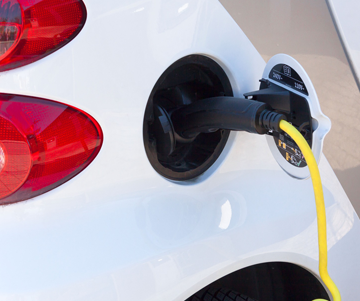
How to purchase an EV
Purchasing an EV is a little different than purchasing a gas-powered vehicle. It is important to understand key elements, such as vehicle range-per-charge and how tax credits work. Here are the typical steps you can take when considering an EV: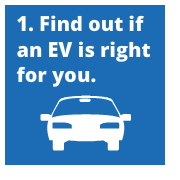
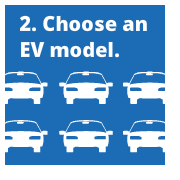

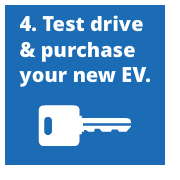
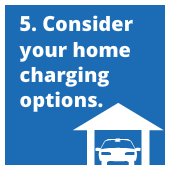
View All-Electric Models (BEV)
View Plug-in Hybrid Models (PHEV)
Is an electric vehicle right for you?

Is your daily commute under 330 miles?
Most of today’s electric vehicles have a driving range-per-charge between 50 to 250 miles. If your daily commute is under 250 miles per day, there is likely an affordable EV model that will fit your needs. Higher end models can have a range-per-charge closer to 330 miles.
When you're looking at EVs, be sure to check the "range-per-charge" for the vehicle. This is the number of miles the car can typically drive between full charges. For example, if the range per charge for an EV is 100 miles and your daily commute is 30 miles, you should be able to go about 3 days between charges (30mi + 30mi + 30mi = 90mi). EV range varies significantly between models.

Do you frequently take long road trips?
Long road trips can present challenges for today’s electric vehicles. Public charging infrastructure and battery technology is continually improving, but planning is still required for long trips.

Do you have off-street parking at your home?
Plugin electric vehicles require charging. Charging can be done with a standard 120V outlet or you can have a 240V charger installed in your garage or driveway. Known as "Level 2 EVSE equipment," 240V charging reduces charging time substantially, is more energy efficient and some EVSE models allow you to schedule charging times, which may allow you to take advantage of special electric rates.

Do you want to save money AND pollute less?
EVs cost less to drive and pollute less, period. An EV uses electricity that is typically generated from sources that are cleaner than burning gasoline or diesel in a vehicle.
Not ready for an all-electric vehicle at this time?
EV range is steadily increasing every year, and there is probably a Plug-in Hybrid Electric Vehicle (PHEV) that would be a good fit for you. While PHEVs still use gasoline and require oil changes, many models have an all-electric range that will meet your daily commuting mileage needs.*Source: U.S. Department of Energy

